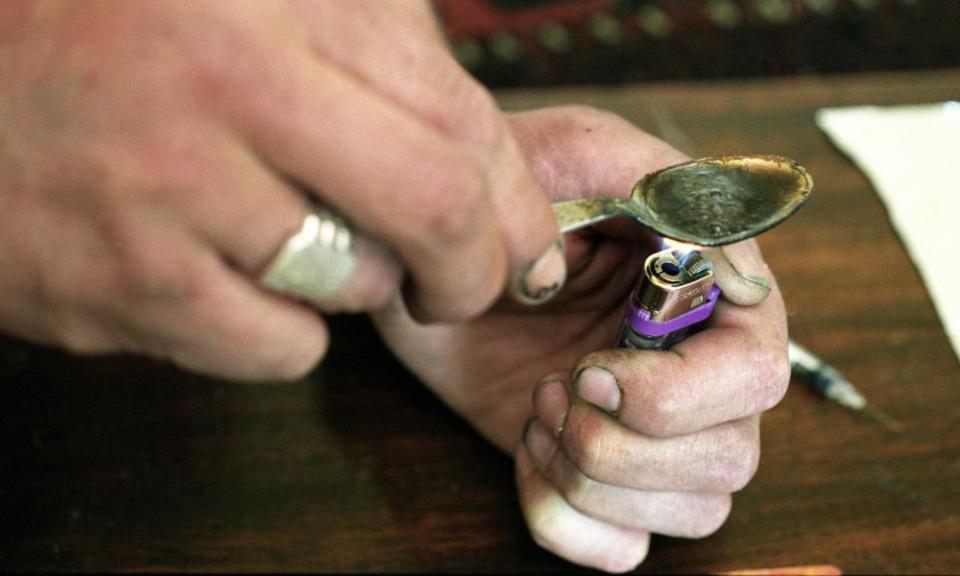Victoria's health minister rejects trial of safe heroin injecting room

Victoria’s health minister, Martin Foley, has said he will not approve a trial of a supervised injecting facility for heroin users in North Richmond, despite a coroner saying it could save lives.
Members of the North Richmond community, including City of Yarra councillors, drug outreach workers, shopkeepers and local residents, have been calling for a safe injecting facility for months, saying the public use of heroin in the area has skyrocketed.
Coroner Jacqui Hawkins backed their calls on Monday, recommending Foley establish a supervised injecting trial in the wake of an inquest into the death of a 34-year-old Melbourne woman, who overdosed in the toilets of a Hungry Jack’s fast-food restaurant on Hoddle Street, Richmond, in 2016.
Foley responded to the recommendation on Tuesday, saying the government had “no plans” to set up a safe injecting room but would carefully consider Hawkins’ recommendations, which included expanding the availability of naloxone, a drug used to reverse the effects of heroin overdose, and reviewing drug and alcohol outreach services in the area.
He also ruled out plans for a pill-testing trial, telling parliament the advice from Victoria police was that such programs were not “up to scratch”. Calls for a pill- or drug-testing trial were renewed this week after 20 people were admitted to hospital after overdosing on GHB at a music festival.
Foley said the government was committed to “harm minimisation”.
“No one wants to see a family member or a friend suffer the horrors of addiction; that’s why we have increased funding to support harm-minimisation steps that look at this as a health issue, first and foremost,” he said.
The Greens spokeswoman on health, Colleen Hartland, said Foley’s response to the coronial recommendation was “shocking”.
“When you have an authority like the coroner saying that this is what you should do, after having done an inquest into a woman who has overdosed in a toilet, you would think the response would be, ‘Yes, this is what we should do,’” she said.
“We give people clean syringes, but we don’t give them anywhere to use, and we send them up dark lanes.”
The City of Yarra, and particularly North Richmond around Victoria Street, is a hot spot for heroin use and attracts users from around Melbourne, according to the coronial report.
North Richmond community health service distributes 70,000 syringes a month as part of a needle supply program, and Youth Support and Advocacy Service, one of two other services that provide syringes and injecting equipment in the area, told the inquest they had seen a tenfold demand for needles in the past two years.
A review of fatal overdoses by the Coroners Prevention Unit found that of the 172 fatal heroin overdoses in 2015 – the highest number since the peak of heroin use in the late 1990s – 20 occurred in the City of Yarra and 15 more were people who had acquired heroin in the City of Yarra and moved elsewhere to inject.
The analysis showed the City of Yarra had the highest frequency of heroin deaths anywhere in Victoria for the past seven years, and the highest number of heroin-related ambulance callouts for the past five years.
Hawkins said many of those overdoses were similar to the death of Ms A, the name given to the subject of the inquest.
Ms A was shown on CCTV entering the toilets of Hungry Jack’s at 12.20pm on 26 May 2016, going back out to the counter for a plastic spoon, then returning 20 seconds later.
She was found in a cubicle, unconscious and with a syringe sticking out of her upper thigh, by a staff member about 1pm, and died 14 hours later in hospital.
“Given the evidence before me, I am convinced that a safe injecting facility in North Richmond is an essential intervention that could reduce the risk of future oversee deaths occurring in circumstances similar to those of Ms A,” Hawkins said.
She said the experience of the Sydney Medically Supervised Injecting Centre in Kings Cross was a compelling argument for the success of a safe injecting room in reducing harm and improving public amenity.
The Sydney facility has managed more than 6,500 overdoses without a single fatality since opening in 2001. According to a 2010 evaluation report, the number of ambulance callouts to Kings Cross dropped by 80% in the first 10 years of the service being established, and the number of needles or syringes collected from or spotted in the local area had reduced.
“There really isn’t anybody sensible that doesn’t acknowledge that supervised injecting facilities will save lives,” Dr Marianne Jauncey, director of the Sydney centre, told the inquest.

 Yahoo News
Yahoo News 